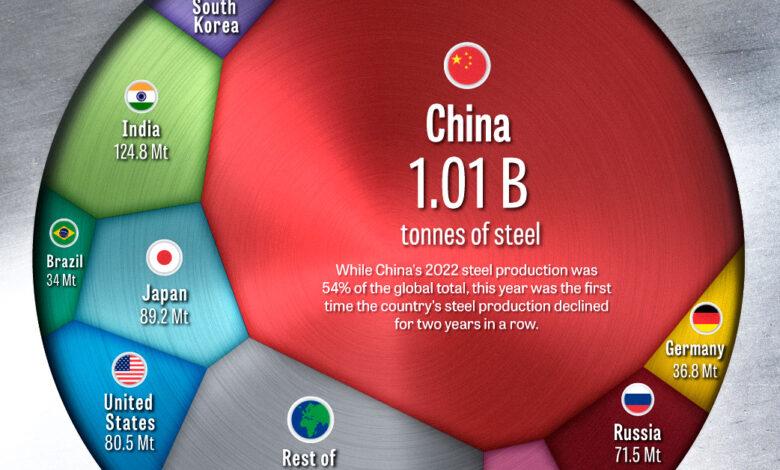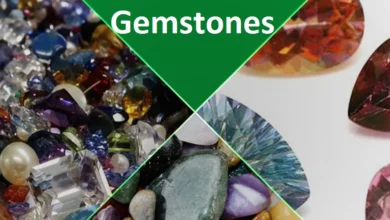
Top 15 Countries with Extensive Metal Resources
Top 15 Countries with Extensive Metal Resources – Metals are some of the most important natural resources in the world. They are essential for construction, manufacturing, technology, and more. Some countries are blessed with an abundance of metal resources, giving them a vital economic edge. This article will examine the top 15 countries with the most extensive metal resources. For each country, we will look at the major metal deposits, the key metals mined, the mining locations, and the importance of the metals to that nation’s economy. By understanding where major metal resources are concentrated globally, we gain insight into international trade, global industries, and the backbone of modern civilization.Top 15 Countries with Extensive Metal Resources
The Top 15 Countries with Extensive Metal Resources Are:
1. China
China tops the list, possessing vast reserves of iron ore, gold, copper, aluminum, lead, zinc, silver, tin, tungsten, and more. Major deposits are located across the country, like the Gobi Desert region, the Lesser Khingan Mountains, and the heavy concentration in the East and South Central regions. China is the leading producer of gold, iron ore, antimony, aluminum, lead, zinc, tin, tungsten and rare earth metals. These extensive metal resources have fueled China’s rapid industrialization and economy growth. Metals account for a significant portion of China’s exports.
👉 Relocate to Canada Today!
Live, Study and Work in Canada. No Payment is Required! Hurry Now click here to Apply >> Immigrate to CanadaRead Also: Top 15 Fruit Juice Flavours in Nigeria
2. Australia
Australia is one of the top metal resource countries in the world. It has the largest gold and iron ore reserves globally and is a major producer of resources like aluminum, copper, lead, nickel, silver, uranium, and zinc. Key mining areas include the Pilbara region in Western Australia (iron ore), Mount Isa in Queensland (copper, lead, zinc, silver), and Olympic Dam mine in South Australia (copper, gold, uranium). The metals industry is vital to Australia’s economy, generating over $100 billion annually and accounting for 19% of its total exports.
3. Russia
Russia possesses rich reserves of iron ore, gold, nickel, aluminum, copper, coal, lead and zinc. Major deposits are found in Eastern Siberia and the Ural Mountains. Russia is the leading palladium producer and one of the top aluminum producers globally. Other key metals include iron ore from the Kursk Magnetic Anomaly region, copper from the Ural Mountains, and nickel from Norilsk. Russia’s metals are critical to its export economy, comprising over 60% of its total exports.
4. India
India holds vast reserves of iron ore, bauxite, chromite, copper, zinc, manganese, silver, and gold. Significant deposits are found in Odisha, Jharkhand, Chhattisgarh, Karnataka, Goa, Telangana, and Andhra Pradesh. It is a top global producer of iron ore and steel. Other major metals include bauxite, chromite and zinc. India’s metals industry generates over 2.6 million jobs and contributes enormously to its GDP. As rapid urbanization continues, so too does India’s metal consumption.
Read Also: Top 15 States for Oil and Gas Reserves in Nigeria
5. Brazil
Brazil possesses the world’s largest iron ore reserves found in the Carajas Mine in Northern Brazil. It also has sizable reserves of bauxite, gold, nickel, manganese, diamonds, gemstones, tin, copper, and more. Major mining activities center around Minas Gerais, Para and Goias. Brazil is among the world’s top producers of iron ore, gold, bauxite, manganese and tin. The metals industry accounts for almost 4% of its GDP. Brazil’s metal abundance has attracted significant foreign investment, though mining activities face environmental scrutiny.Romantic love message
6. South Africa
South Africa holds vast quantities of platinum, gold, iron, copper, manganese, chromium, vanadium, and diamonds. Its main mining areas are the Bushveld Complex and the Witwatersrand Basin. South Africa is the world’s top platinum producer and one of the leading gold producing countries. Other key metals and minerals include iron ore, manganese, chromium, and diamonds. Mining accounts for over 7% of South Africa’s GDP and creates over 1 million jobs. South Africa faces challenges with power supply and environmental impacts from mining.
7. Canada
Canada possesses a wealth of metals like nickel, gold, silver, copper, cobalt, zinc and uranium. Major deposits are found in Ontario, Quebec, British Columbia and the Arctic territories. It is a top global producer of potash, aluminum, cobalt, nickel, platinum group metals and diamonds. Metals account for over 20% of Canada’s total exports. However, metal prices fluctuate contributing to the volatile nature of Canada’s mining industry. Canada must also grapple with pollution and climate impacts from metal mining and refining.Information guide Nigeria
👉 Relocate to Canada Today!
Live, Study and Work in Canada. No Payment is Required! Hurry Now click here to Apply >> Immigrate to Canada8. Mexico
Mexico’s mineral wealth includes silver, gold, copper, lead, zinc, iron ore and fluorite. Major deposits are located in Sonora, Chihuahua, Coahuila, Durango and Zacatecas states. Mexico is the world’s largest silver producing country. It is also a top global producer of lead, zinc, copper and iron ore. Revenue from metal mining represents 2.7% of Mexico’s GDP. However, there are concerns about working conditions, pay and environmental issues in Mexico’s mining industry.JAMB portal
Read Also: Top 15 Nutritious Fruit Juices in Nigeria
9. Indonesia
Indonesia possesses sizeable reserves of tin, nickel, copper, bauxite, coal, gold and silver. Major sites include islands like Bangka-Belitung, Sulawesi and Papua. Indonesia is the world’s largest exporter of tin. It is also a key global supplier of nickel, bauxite, copper and coal. Yet Indonesia faces issues with illegal mining, environmental degradation, and indigenous rights abuses. But metals still contribute over 20% to its total exports.
10. Kazakhstan
Kazakhstan holds substantial reserves of chromite, wolfram, lead, zinc, manganese, iron ore, gold, copper and uranium. Deposits are located across the country, notably at the Ekibastuz, Zhezkazgan and Karagandy regions. It is among the top global producers of chromium and uranium. The metals sector accounts for over 40% of its total exports. While the industry has fueled Kazakhstan’s economy, it has also raised issues around environmental damage.
11. Chile
Chile has enormous copper, lithium, molybdenum, iron ore, gold, and silver reserves. Major sites include the Atacama region and El Teniente mine. It is the world’s largest copper producer and a major lithium producer. Copper alone accounts for over 50% of its exports. While mining has boosted Chile’s economy, protests have emerged around water use, pollution and indigenous rights. Chile also faces challenges with illegal mining and metal commodity volatility.NYSC Portal
12. Peru
Peru has rich deposits of copper, gold, silver, lead, zinc, tin, iron ore and molybdenum. Major sites are found in the Andes Mountains and southeastern regions. It ranks top five globally for copper, silver, zinc and tin production. Mining is vital to Peru’s export economy, comprising over 60% of its total exports. However, Peru struggles with illegal mining, community relocations, and environmental contamination from mining.
Read Also: Best 15 Immune-boosting fruits for HIV Patients
13. United States
The U.S. has ample reserves of iron ore, copper, lead, zinc, gold, uranium and phosphates. Major deposits are found in Montana, Nevada, Minnesota, Arizona, Utah and Alaska. It is in the top global producers for copper, gold, lead, zinc and phosphate. Yet, it has to import certain metals to meet its demand. While mining has shaped the U.S., it also raises environmental concerns around habitat loss and water pollution.
14. Turkey
Turkey possesses reserves of chrome, copper, gold, lead, zinc, manganese, mercury, silver and iron ore. Notable areas include Eastern Anatolia and the Black Sea region. Turkey is among the world’s largest gold, boron and chromium producers. Mining is important to Turkey’s export economy. Yet the industry has faced fatal accidents highlighting labor and safety issues. Environmental impacts also raise challenges.
15. Sweden
Sweden holds significant reserves of uranium, iron ore, copper, lead, zinc and silver. Its key region is the Mineral Line spanning through Central and Northern Sweden. It stands as the largest iron ore producer in the EU. Sweden’s metals industry represents over 50% of the country’s total exports. However, Sweden has shifted focus from metal dependence to high tech and IT economies for future growth.Good morning My Love Message
Read Also: Top 15 Resource-Rich States in Nigeria
Conclusion
In conclusion, minerals and metals form the backbone of economies, industries and infrastructure globally. But their abundance is concentrated heavily in certain nations, like China, Australia, Russia and Brazil. Massive mining of these resources has fueled rapid development. Yet it has also raised troubling concerns around environmental damage, indigenous rights and dependence on finite commodities. Moving forward, nations gifted with metal riches must mine responsibly and steer metal wealth into sustainable economies. At the same time, metal-poor nations may need to recycle, substitute and reduce to conserve supplies. Metals will likely remain essential to civilization, but a balanced approach is required.
Check JAMB RESULT
Check and Confirm: How much is Dollar to Naira






